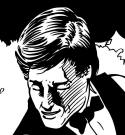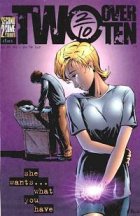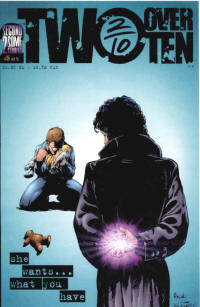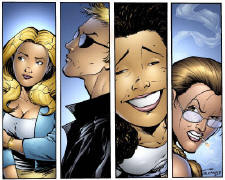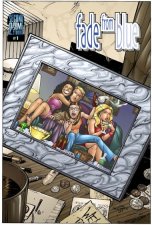|
An Interview With Myatt Murphy
A few months ago, the office of Fanboy Planet received an e-mail touting a brand-new comic publisher. We'd never heard of the people involved, but writer Myatt Murphy at least caught our interest with his resume. At some point, we reasoned, we must have read his work in one of the myriad legitimate magazines he'd cited, including the beloved Maxim. (Curiously, not a single credit for Children's Highlights. Oh, well.)
Then another e-mail came, trumpeting that Second 2 Some Studios debut mini-series would not actually be solicited until it was completely finished. What was this? A publisher determined NOT to miss deadlines? Were these people crazy?
And then Myatt started sending us actual comics. That debut mini-series, Two Over Ten, is a dark, dense tale of people awakening to abilities humanity was not meant to have, save for the one young girl selected by fate to keep them from activating. And if that made our brains hurt, the back-up series, Far From Saints, was pretty funny and offered a surprising scenario for the end of the world.
Myatt agreed to an interview months ago. But frankly, the necessity of earning actual money kept me from taking the time to sit down and pepper him with questions. In the meantime, Second 2 Some took the next cool step of actually offering their next series, Fade From Blue, at 1980's prices. And they sent us an early preview copy of the first issue, which will be covered here next week.
This week, however, the proverbial bullet was bit, and Myatt and I exchanged a few words (all nice and friendly). So ladies and gentlemen (at least, he hopes there are some ladies reading this), the Fanboy Planet interview with Myatt Murphy…
Derek McCaw: How'd you go from writer for Maxim and Men's Health (among others) to comic book writer?
Myatt Murphy: Well, I still do both. Writing features for magazines is still my 9 to 5 job, while writing for Second 2 Some Studios has become everything in between. I think the only similarities are the schedules and the opinions. Writing for magazines taught me to make deadlines and take criticism, but the two are so completely different from one another.
I met Chris Rhoads (The artist on Two Over Ten #1-3) when I was working for Men's Health. During lunch breaks, we would bang out story plots and began developing an 8-page story about Shang-Chi (Marvel's Master of Kung Fu). It was a bizarre story that had Shang brooding in a hospital room where a very sick Fu Manchu (Shang's father and main rival) was laid up dying of pancreatic cancer. Realizing his demise, Fu had staged the ultimate stroke against Shang to destroy his reputation before he was too weak to think, a plan that obviously worked because Shang is describing it in flashback panels as he yells angrily at Fu.
The plot is too convoluted to describe here, but in the end, you realize that Fu never set up this elaborate scheme to get in the last stroke at Shang before he died…he did it because he didn't want to die in a way that wasn't befitting of his greatness. So he does something he knows will finally cause Shang to snap and take his life. It was tragic, it was brutal…and then we realized, it was someone else's characters!!! That's when we decided to focus on something we could actually print. Two Over Ten was born right after that
DM: What attracted you to comics? Why not short stories, novels, or even screenplays?
MM: I think I got into writing comics for the exact same reason every other writer and artist has. It definitely taps that childhood obsession every reader has with making their own comic and telling their own story. However, I also enjoy the "storyboard storytelling" element, which lets YOU tell YOUR story EXACTLY as you want it to be told.
I read a lot of novels by authors who amaze me with their ability to weave incredible stories, but I've also thought that the full impact any book can have on a reader is limited to how far the reader's imagination will take them. I could have written these stories as screenplays, but the chance of anyone else ever seeing them would be dependent on getting a break in Hollywood.
Comic books essentially ARE screenplays with all the storyboards already done. It's all the controlled visualization of the movies without needing a big break or a bigger budget. That's why I believe that comics will never die. There are too many creators that rely on the forum for getting their message out there, even if the audience isn't as large as it once was.
DM: Many independents start up and have a heck of a time getting attention. I've talked to a couple that had to fight for even limited distribution. But you seem to have hit a good stride out of the gate, even getting house ads from Comicraft and Image. What did you do to gain immediate notice from distributors and other companies within the industry?
MM: We're not too proud to beg, bribe or wash (Diamond Distribution's President Steve) Geppi's car. Actually, we had all five issues of Two Over Ten completely finished before we ever approached Diamond. I had read somewhere that the one of the biggest problems Diamond has with new unknown publishers is being able to trust they can deliver what they promise. And I don't blame them. If many of the bigger publishers have a hard time meeting their deadlines, then how can you believe someone that claims they have a great product that Diamond must absolutely stand behind. We didn't want Diamond to discount us based on that, so we worked hard to have Two Over Ten done before we made contact. I would encourage any publisher to do the same if it's possible.
DM: You're doing your best to participate in Free Comics Day with the $1 first issue of Fade From Blue. Is Second 2 Some on a track to bring new readership into comics, or content with a percentage of the existing readership?
MM: I believe there's a certain section of the already existent comic book fans that we'll pull in, but we definitely hope to pull in some new readers as well. Fade From Blue is a story that should attract both male, and more importantly, female readers alike. One person that reviewed the comic called it the "comic to get your girlfriend into comics", which I thought was pretty fitting.
As for offering the first issue for $1, we wished we could offer readers something free on that day, especially because Fade From Blue #1 is scheduled to be released on the same week. That's why we thought giving the comic a lower, friendlier cover price may help retailers in a different way.
If Free Comics Day works as we hope it does, many new customers will be milling around. That means the comics on sale that week are going to be their first experience with how powerful comic books are as a story-telling medium. The Spider-Man movie and free merchandise may make a lot of curious readers stop by, but if the current issues ON the shelves that month aren't also doing their part to peak interest and be instantly accessible to new readers, the full effects of Free Comics Day may never be realized.
Lowering our price may cause us to lose money, but if it helps retailers catch the attention of the cost-considerate consumer, then it's done its job. Hopefully, other smaller publishers that can't afford to supply copies nationwide but still want to make a national impact may consider the same cost-cutting approach next year.
DM: What else are you trying to catch new readers' attention?
MM: Besides the consistent lower cover price and having a story angle that should attract as many female readers for its subject matter as it does male readers for its sarcasm, each issue of Fade From Blue will also feature something no other comic has tried before, a two-page column called Christa's Corner.
One of the characters in Fade is a freelance relationship writer named Christa, a sarcastic, bitter young woman who can verbally hand you your ass without a second thought. What we decided to do is show the type of articles she writes by giving the reader a taste of her column. Each issue will feature some of Christa's witty prose, articles that will actually be ghost written by some of the nation's leading relationship writers for Cosmo, Glamour and Maxim.
The last positive step is hope to make a retailer's job easier. It's not fair to expect retailers to take a risk on every book they order without knowing if they have a customer for it. Several completed pages from each new issue of Fade From Blue will be accessible on our website two months before actually hitting the stands, allowing a retailer and the reader to see what they are about to order from the catalog (while giving them the peace of mind that it's well enough along to come out on time).
DM: What do you think should be done to revitalize the comics industry - or do you think it already has been?
MM: I think we have to expand the market by offering more and more diversity, plain and simple. Right now, it caters to certain segments of the population and doesn't offer enough to other types of readers.
I think the other area that could use some work is the pricing. Almost every other industry will lower prices when things are bad to get more people to experience their product. I don't think our industry does that enough. As a comic book fan, I've always wished that the prices were lower so that I could buy and read more titles. As a publisher, it's hard to still hold onto that view if you're not at least doing something about it. That's why we decided to stay true to offering Fade From Blue #2 and beyond for just $1.50, half of the industry standard for indies.
DM: How has the reception for Two Over Ten been?
MM: The response has been really surprising and very positive. The one mistake we made was not giving readers catching the series in the middle some sort of primer. But anyone that has read all five issues has really enjoyed the books. We've had editors from different publishers contact us to say they really like it, which is flattering and great to hear.
We've also gotten a lot of reorders from our distributors now that all five issues are out, so we decided to take the last remaining first prints of the books and reissue the entire series in a limited set of 500 copies in June 2002, with each set signed by myself and both artists on the book, Chris Rhoads and Scott Dalrymple. To stay true with our lower price policy, we're offering all five issues at cover price. I believe the total is $15. Once they're gone, we don't plan on a second printing. Instead, we will be re-launching the entire series as a trade paperback, which will also be cheaper than most trades out there.
DM: Digging around in my old e-mails, I found an announcement of your undercover research, before I had any clue what was going on with you guys. So what can you tell me about that experience? Any particularly intense moments involved with that research? How did that end up shaping your story?
MM: As a magazine writer, I've had the chance to do some pretty silly stuff, from being thrown into a mock POW camp to hanging with drug agents. These experiences gave me the chance to talk to officers, soldiers and such about tools and tricks in their professions. A couple of those elements are described in the comics, but not as many as we originally thought we would use.
In issue #2 of Two Over Ten, a few crime lords are discussing how to smuggle money into the country using wire bras, which apparently make money look like fabric when laid over bills that are placed on their sides. Many people probably don't realize that if you're caught smuggling money into the country, you can simply disavow knowing about it and simply walk away without being arrested. Minus the money, of course.
I learned this from an undercover officer I met that works in immigration airport security. There are a few more of those things in our books, but it doesn't shape the storyline too much. We don't want it to read like something The History Channel would produce; we just wanted to add a few realistic details to the plot.
DM: The series ends on an open note. Are you planning to revisit it, or will Second 2 Some just keep jumping around concepts?
MM: I'd love to do Two Over Ten again, but not right away. I ended the series with a definite finality yet an opportunity to keep going in a very X-Files/Quantum Leap-esque way. The main threat of the story was the child, and even though his threat is subdued for now, he's still very much alive and so is what makes him dangerous to all of us. At the end of the book, the main hero (Brenden Wynne) sets off to help Casey, but he's really using her to save his son. If she finds out what he's doing, he's probably going to die, either by her hand or the other mysterious woman anyone that's read the series knows about. Either way, he's screwed and it's a race against time. One day, we'll revisit it, because there are an infinite amount of stories that can be told thanks to the way we ended it.
DM: Any chance of Far From Saints (the back-up story in Two Over Ten) getting its own series?
MM: I'd love that too. The series received a lot of praise, even by the few reviewers that thought Two Over Ten was too complex. It's the story of a jerk that decides to pack it in and drive halfway across the country after losing his job and girlfriend. When he arrives at a copy store in the middle of the desert, he grabs a soda, only to find out he supposedly a co-owner of the joint. What he soon finds out is that he's just arrived as his new job…as God.
As it stands right now, we will be compiling all five back-up stories (which make up one 30-page tale) and offering a Far From Saints One-Shot in August 2002 to test the waters. Scott Dalrymple and I had a lot of fun on that story, so it would be great to go back to that one as well. That's why we ended it just like Two Over Ten, with the option to continue it down the road.
DM: The series is pretty wise-assed; how does it tie in with your own beliefs?
MM: There are definitely a few snippets of my own religious theories, but hey, before your readers think Far From Saints is one of those pamphlets bald guys in robes hand out at airports, it's definitely not too religious. I personally believe in all religions, so long as whichever one you choose helps you get to that same spiritual place. That's why I wrote the series, which has the reader discover that God, Buddha, etc decided he/she was sick of taking the blame from Mankind and places a bunch of losers at the helm in his/her place. Dorian, the main character, is the king of the losers but even though he's not very lovable, he does end up saving Mankind in the end.
DM: Two Over Ten started with the girl Casey, but it really felt like you were more comfortable writing Brenden, and the series shifted to reflect that. So with Fade From Blue, why do a series about four women?
MM: Hmm, that's a really interesting observation that I hadn't really thought about before, but now that I look at it, I think the shift to Brenden was unconsciously intentional. Casey was written with more depth in the beginning, issues #1 and #2, because I wanted the reader to feel sympathy for her character and for what she had to do, which was to destroy the child causing all the chaos. Then I shifted the focus on Brenden, the father, so the reader could start to feel sympathy for him in issues #3 and #4. The last issue went back and forth between the two, which hopefully put the reader at odds with themselves over who they thought was doing the right thing. It's really a tragic story for all the characters involved.
Fade From Blue was created out of the fact that I wanted to write something that wasn't rooted in science fiction, like Two Over Ten, or historical fantasy, like Far From Saints.
Fade from Blue #1 is the story of four half-sisters who share the same missing polygamist father. Brought together by the tragic deaths of each of their mothers, the four form a family of their own while waiting for their Daddy to return. Nine years later, the truth of what really happened in the past threatens to unravel the existence they've created for themselves in the future. And expose the lies they've been keeping from each other all this time.
I wanted to simply write a reality-based story that both men and women readers alike would enjoy. I think women have a harder time finding themselves in what's offered in comics today, so we chose our next project to be something that would at least add one more option for them besides storylines that are ONLY geared for women. Men and women watch Friends, men and women watch Survivor, so we thought a comic book that had something to offer both sexes was sorely needed.
DM: You've got some anonymous "relationship" writers contributing Christa's columns. How much are they influencing you in writing the actual series?
MM: To get those writers onboard, they were each shown previews of the first issue. Each definitely had their points to add about the characters and a lot of those ideas, from clothing suggestions to their slang, were definitely considered and added. But the plot and story are definitely still all me.
DM: So what does Second 2 Some have planned for beyond this?
MM: Well, we have already pencilled and written the first eight issues of Fade From Blue at this point, so the main focus is staying on target and producing the series on a bi-monthly basis. In between issues, we'll be reintroducing Two Over Ten and Far From Saints as I mentioned, but we're anxious to stay the course on a regular book and work on building a fan base, listening to what the readers think and trying to give them what they haven't seen before.
DM: Will you be collecting these into trade paperbacks?
MM: Yes, the first ten issues of Fade From Blue take place in the span of just one week. Once they're out, we would like to see them all collected in trade form to make it easier to introduce new readers that are more trade-savvy to the story.
DM: Right now you're writing everything, with a couple of artists. Do you intend to expand Second 2 Some? When do you become a McFarlane or Silvestri?
MM: I have a lot of ideas but definitely not enough time to do them all. Some I would love to have others run with the ball to see how they could develop them. Others were born out of experiences that wouldn't feel right having anyone else write them but me. But right now, Fade From Blue is definitely our primary focus and we really want to stay dedicated to it.
DM: Are you planning to sell out to Hollywood?
MM: Man, would I, but not for the reason that you may think. It would be fantastic to see the stories inside Two Over Ten and Fade From Blue shown in a different forum.
I know some people look at having their properties transformed into movies as copping out, but I think Hollywood has become one of the most effective tools for comic book readers to use in proving just how powerful our medium is. I love being able to silence people that think they wouldn't be into comic books by telling them the movies they like (Men In Black, Blade, From Hell, etc.) were comic books before they ever saw the big screen.
Hopefully, the more comic books we can get on the big screen, the more people we'll be able to get into comics. I think we as an industry, and that includes the fans, need to stick behind each other and not look at each attempt on the big screen as a cop-out, but as a chance to prove to the rest of the world that we're in tune to a medium that's always been and always will be on the cutting edge of creativity.
DM: The phone rings. It's one of the Big Publishers. In the back of your mind, whose toys do you really want to play with?
MM: Oh, most definitely DC Vertigo. Most of the ideas I have stored away lean more towards realistic fantasy, so being able to get any of those ideas to see the light of day would be a thrill. Before Fade From Blue, Dalrymple and I were about to work on a twisted project that was perfect for their line of books, then 100 Bullets came out. The story idea we had wasn't exactly the same, but dealt with a limited amount of bodies instead of bullets, so we scrapped it.
DM: Any last words of encouragement, wisdom, or self-aggrandizement?
Everyone reading this is a comic book reader. That means that everyone reading this has the same dream of doing their own comic. If you have a story to tell and can't find anyone to publish it, do it yourself. The comic book industry is one that needs new, fresh ideas and chances are, you're the one with the idea they need most…but they'll never know what they've been missing unless they see it first.
Definitely check out the Second2Some site and tell 'em Fanboy Planet sent you.
Discuss this and more in the Fanboy forums.














